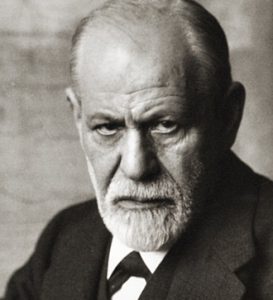Extract – Freud on Religious Experience as Neurosis
April 8, 2020
Extract – Freud on Religion
Source: https://www.verywellmind.com/freud-religion-2795858
Religion According to Freud

Freud expressed the view in 1907 that religious rituals were ‘a universal obsessive neurosis’.
So how did Freud feel about religion? In some of his best-known writings, he suggested that it was an “illusion,” a form of neurosis, and even an attempt to gain control over the external world.
Among some of Freud’s most famous quotes on religion, in his book New Introductory Lectures on Psychoanalysis (1933), he suggested that “religion is an illusion and it derives its strength from its readiness to fit in with our instinctual wishful impulses.”
In The Future of an Illusion, Freud wrote that “religion is comparable to a childhood neurosis.”
In the book New Introductory Lectures on Psychoanalysis, he suggested that “Religion is an attempt to master the sensory world in which we are situated by means of the wishful world which we have developed within us as a result of biological and psychological necessities. […] If we attempt to assign the place of religion in the evolution of mankind, it appears not as a permanent acquisition but as a counterpart to the neurosis which individual civilised men have to go through in their passage from childhood to maturity.”
Freud’s Criticism of Religion
While fascinated by religion and spirituality, Freud was also at times quite critical. He critiqued religion for being unwelcoming, harsh, and unloving toward those who are not members of a specific religious group.
From The Future of an Illusion (1927): “Our knowledge of the historical worth of certain religious doctrines increases our respect for them, but does not invalidate our proposal that they should cease to be put forward as the reasons for the precepts of civilization. On the contrary! Those historical residues have helped us to view religious teachings, as it were, as neurotic relics, and we may now argue that the time has probably come, as it does in an analytic treatment, for replacing the effects of repression by the results of the rational operation of the intellect.”
Some of his most critical comments can be found in his text Civilization and Its Discontents. “The whole thing is so patently infantile, so foreign to reality, that to anyone with a friendly attitude to humanity it is painful to think that the great majority of mortals will never be able to rise above this view of life,” he suggested. “It is still more humiliating to discover how a large number of people living today, who cannot but see that this religion is not tenable, nevertheless try to defend it piece by piece in a series of pitiful rearguard actions.”
“Religions, at any rate, have never overlooked the part played in civilization by a sense of guilt. Furthermore – a point which I failed to appreciate elsewhere – they claim to redeem mankind from this sense of guilt, which they call sin.”
Freud’s Psychoanalytic Perspective on Religion
Freud’s psychoanalytic perspective viewed religion as the unconscious mind’s need for wish fulfilment. Because people need to feel secure and absolve themselves of their own guilt, Freud believed that they choose to believe in God, who represents a powerful father-figure.






0 Comments